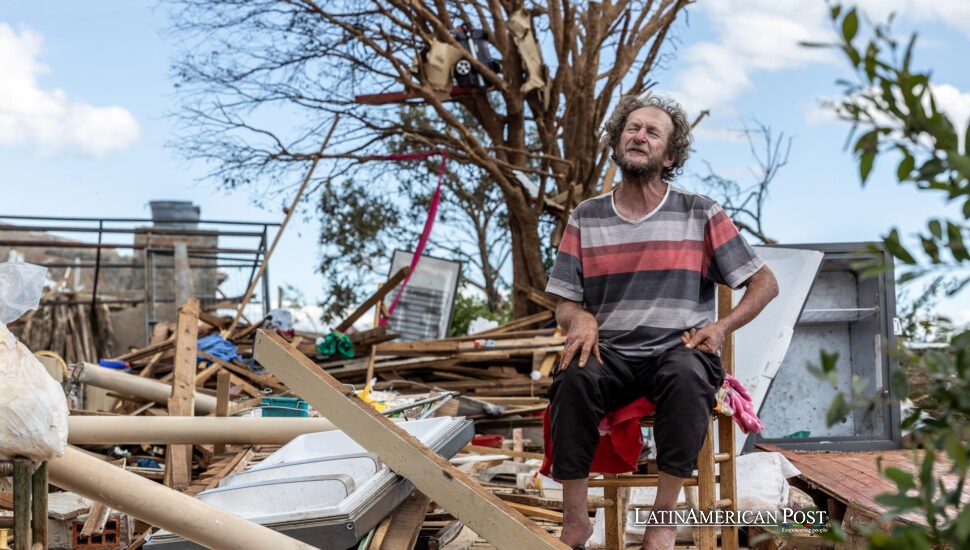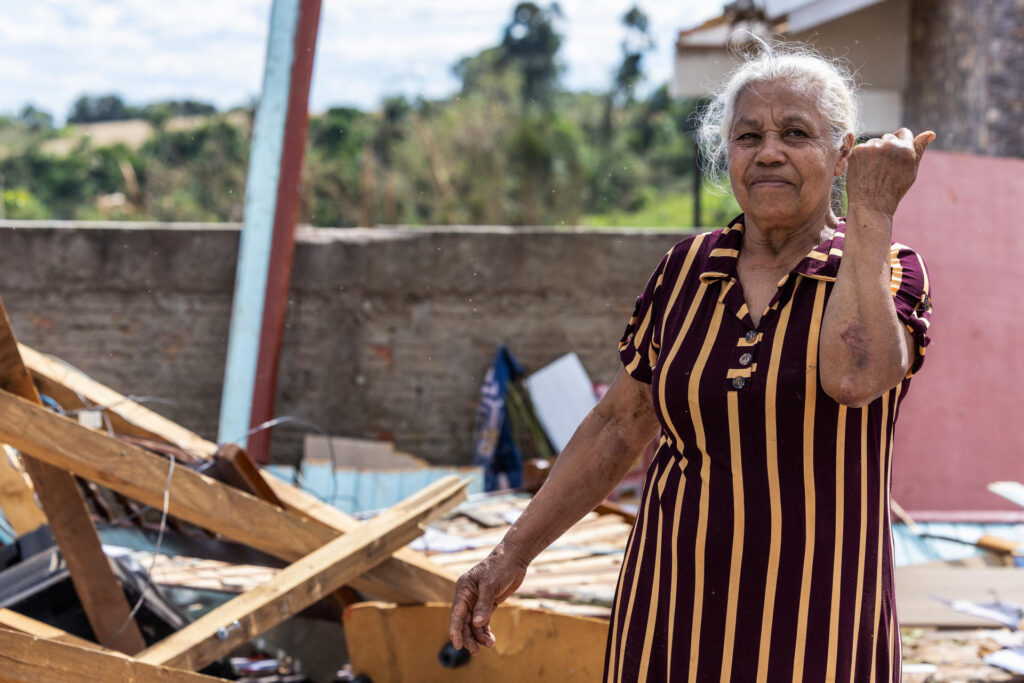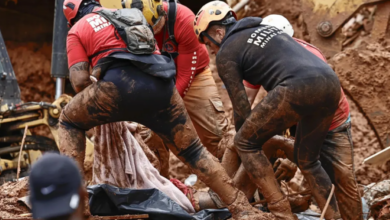The Tornado That Stole Time from Rio Bonito do Iguaçu

In minutes, a violent tornado tore through the southern Brazilian town of Rio Bonito do Iguaçu, killing six and injuring hundreds. Nearly 700 families were left without homes. Survivors now shelter in schools and gyms, piecing back lives the wind dismantled.
Two Minutes That Erased a Town
The warning came not as a siren, but as a roar. The sky darkened, lowered, and then moved, a wall of wind that folded roofs, uprooted trees, and sent debris spiraling like shrapnel. In less than two minutes, Rio Bonito do Iguaçu ceased to resemble itself.
The tornado, with gusts reaching 250 kilometers per hour, shredded nearly every building in this municipality of 13,500, wedged near Brazil’s borders with Paraguay and Argentina. When it passed, six were dead, more than 800 were injured, and 90 percent of the town lay in ruin. Power lines twisted like ribbon; cars lay belly-up on sidewalks.
Civil Defense officials said the storm formed within an extratropical cyclone that had already menaced southern Brazil. But no radar image or warning could prepare residents for the sound of their roofs lifting, for the pressure that made walls tremble as if they were breathing.
On what used to be his street, 61-year-old Edamir Gades pointed to a single piece of furniture. “Here was my home, and nothing is left. Only that bed,” he told EFE, standing in what had been his bedroom, now open to the sky. “The house is destroyed. The only thing that remains is this room, but without a roof.”
He said it calmly, as if reading from a ledger, until he looked down at the rubble where his door used to be. “We have to do everything again,” he whispered.
Counting Losses, Finding Neighbors
The tornado scattered people as ruthlessly as it scattered belongings. Electricity was gone. Water lines were broken. With night coming, about 1,000 residents packed into makeshift shelters in nearby Laranjeiras do Sul, classrooms turned into dormitories, gymnasiums into villages.
In one corner, a grandmother folded laundry under a flashlight beam. In another, children slept on cots beneath blankets emblazoned with soccer teams. The smell of instant coffee and damp clothes filled the air.
“We lost everything,” said Susseane Somali, a homemaker whose arms were mottled with bruises. “I can’t even think about it now,” she told EFE. “We spent our whole lives building, so I don’t know how long it will take to build it all again.”
She described arriving home just before sunset, her children still in their uniforms. “We heard the roar, it was like a jet engine. We didn’t have time for anything; we covered the kids with our bodies in the living room, and everything began to fall on top of us.”
Next door, José Filho, retired and gray-eyed, could still hear the wind in his head. “In one minute, it knocked everything down,” he said to EFE. “At my age, I’ve never seen a storm like that.” He saw his neighbor lifted and hurled across a field. “She’s all broken in the ICU now.”
Lourdes dos Santos, who had been on the phone when the first gust hit, hung up instinctively and reached for her Bible. “I hid under the dining table,” she told EFE. “I saw two winds coming from opposite directions, and they tore out a tree behind the house. I thanked God the gale didn’t take me with it.”
Relief travels fast in a disaster. Even amid ruin, neighbors swap blessings and check names: Have you seen your cousin? Do you have water? Need a ride? Kindness becomes a currency when the banks are gone.

Witnesses to a Wind That Lifted Everything
Every survivor tells the same story, only in a different key. A door vanishes mid-hinge. A cistern takes flight. A wardrobe slides across tile as though skating.
Sister Rosane Correa Teixeira, of the Sisters of Saint Joseph, remembered hearing the first crack of thunder and instinctively unplugging the appliances. “There was no time,” she told EFE. “The front door flew off, and the roof began to collapse. Objects started flying through the house, such as tree branches, pieces of tile, and water tanks. It was terrifying. It felt like the house would fall because everything made a terrible noise.”
She pressed herself into a hallway, praying that the church next door would hold. “All I could do was call on God’s mercy, for the winds to calm so we wouldn’t all die.”
When the noise finally stopped, the silence was nearly as violent. In the dark, she lit a candle and tried to measure time. “People said it lasted only a minute,” she said. “For me, it was an eternity.”
That feeling lingers in the survivors’ bodies, the startle when plastic rustles, the chill when wind rattles a window. Recovery begins not with bulldozers but with the return of small sounds: the scrape of a broom, the clink of a teacup, the hush of someone sweeping glass into a pile. Each gesture is both cleanup and therapy.
Faith, Logistics, and the Long Rebuild Ahead
The arithmetic of disaster is cruel: decades to build, seconds to lose. Rebuilding will invert that equation, slow, painstaking, expensive. Tarps and plywood come first, then forms and permits, then the long wait for contractors. Aid will arrive; it always feels too late.
For now, Rio Bonito do Iguaçu survives on improvisation. Volunteers drive older people to clinics; teachers turn classrooms into day care; neighbors share nails and lumber pulled from the wreckage.
Gades, the man with the single bed, spends his afternoons sorting tile from splintered beams. “Each piece we find is one less we have to buy,” he said. Around him, stray dogs sniff at a landscape they no longer recognize.
The storm that birthed the tornado has moved east, its winds spent. What remains are questions that move more slowly: How do you keep a community intact when its geography has been erased? How do you turn shelters into neighborhoods again?
Faith fills the gaps that planning can’t yet reach. “I thanked God the gale didn’t take the house,” Lourdes repeated softly. But the next test will be practical, sirens that reach every street, building codes that favor steel over wood, community drills before the season turns.
On the outskirts of town, blue tarps glint in the sun like a second horizon. The hills beyond look untouched, a cruel contrast. Yet inside the shelters, life resumes its stubborn rhythm. Someone boils water for coffee. A boy recites his lesson under a gymnasium light. A broom whispers across tile that yesterday was open sky.
Rio Bonito do Iguaçu will rebuild not in grand gestures but in small refusals, one plank, one prayer, one neighbor helping another. As Sister Rosane told EFE, the longest minute of their lives felt endless. The recovery will feel that way, too: one long act of defiance against the wind that tried to erase them.
Also Read: Falmouth Without a Roof: Jamaica’s Colonial Gem Battles to Rebuild After Hurricane Melissa





